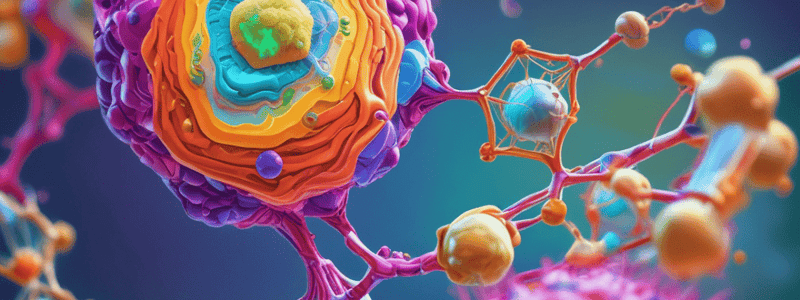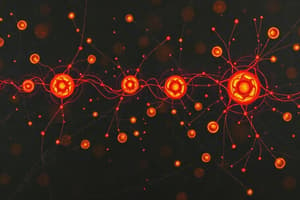Podcast
Questions and Answers
Which of the following is a 6-carbon molecule?
Which of the following is a 6-carbon molecule?
- Succinate
- Citrate (correct)
- Acetyl CoA
- Oxaloacetate
Which of the following is a metabolic pathway that involves the breakdown of complex molecules into simpler ones, releasing energy?
Which of the following is a metabolic pathway that involves the breakdown of complex molecules into simpler ones, releasing energy?
- Anabolism
- Catabolism (correct)
- Amphibolism
- Ketogenesis
During electron transport, protons are not pumped out of the mitochondrion at which complex?
During electron transport, protons are not pumped out of the mitochondrion at which complex?
- Complex III
- Complex I
- Complex IV
- Complex II (correct)
Glycogenolysis can be stimulated non-hormonally by the accumulation of which molecule?
Glycogenolysis can be stimulated non-hormonally by the accumulation of which molecule?
Which metabolic pathway is responsible for the rapid rise in lactate concentration during a 400-m sprint?
Which metabolic pathway is responsible for the rapid rise in lactate concentration during a 400-m sprint?
Which metabolic pathway is responsible for the decline in lactate level after the 400-m sprint?
Which metabolic pathway is responsible for the decline in lactate level after the 400-m sprint?
Which hormone(s) can stimulate glycogenolysis?
Which hormone(s) can stimulate glycogenolysis?
Which of the following mammalian cells is unable to aerobically metabolize glucose to carbon dioxide?
Which of the following mammalian cells is unable to aerobically metabolize glucose to carbon dioxide?
What is/are the fate(s) of pyruvate?
What is/are the fate(s) of pyruvate?
Which of the following is a product of the citric acid cycle?
Which of the following is a product of the citric acid cycle?
Which of the following is not a substrate for gluconeogenesis?
Which of the following is not a substrate for gluconeogenesis?
Which of the following is a correct statement regarding the process of lipolysis?
Which of the following is a correct statement regarding the process of lipolysis?
In metabolic pathways, which process involves the synthesis of ketone bodies from acetyl CoA?
In metabolic pathways, which process involves the synthesis of ketone bodies from acetyl CoA?
The term 'glycogenesis' is correctly defined as:
The term 'glycogenesis' is correctly defined as:
Which of the following correctly describes glycolysis?
Which of the following correctly describes glycolysis?
In the chemiosmotic hypothesis, which component does NOT play a role?
In the chemiosmotic hypothesis, which component does NOT play a role?
Which scenario would disrupt the chemiosmotic gradient according to the text?
Which scenario would disrupt the chemiosmotic gradient according to the text?
Which method can be used to identify bacteria based on enzyme activity and substrate utilization?
Which method can be used to identify bacteria based on enzyme activity and substrate utilization?
What is the primary purpose of FISH in bacterial classification?
What is the primary purpose of FISH in bacterial classification?
Which bacterial genus is associated with tetanus and botulism?
Which bacterial genus is associated with tetanus and botulism?
Which bacterial species is known for causing pneumonia and is Gram-positive?
Which bacterial species is known for causing pneumonia and is Gram-positive?
Which technique can be utilized to differentiate between different strains of bacteria by analyzing their protein profiles?
Which technique can be utilized to differentiate between different strains of bacteria by analyzing their protein profiles?
Which bacterial species is commonly associated with foodborne illnesses like gastroenteritis?
Which bacterial species is commonly associated with foodborne illnesses like gastroenteritis?
What is the significance of core microbiota, as mentioned in the text?
What is the significance of core microbiota, as mentioned in the text?
How does the microbiota composition of monozygotic twins compare to dizygotic twins, based on the text?
How does the microbiota composition of monozygotic twins compare to dizygotic twins, based on the text?
What is suggested by the finding that the microbiota of family members is more similar than unrelated individuals?
What is suggested by the finding that the microbiota of family members is more similar than unrelated individuals?
Why is it mentioned that approximately 75 species are common to over 50% of individuals?
Why is it mentioned that approximately 75 species are common to over 50% of individuals?
What does the text imply about the relationship between microbial ecosystems and human biology?
What does the text imply about the relationship between microbial ecosystems and human biology?
In what way do monozygotic twins provide insights into the interplay between genetics and environmental factors in shaping microbiota composition?
In what way do monozygotic twins provide insights into the interplay between genetics and environmental factors in shaping microbiota composition?
According to the phylogenetic tree of life shown, which of the following groups is most closely related to animals?
According to the phylogenetic tree of life shown, which of the following groups is most closely related to animals?
Based on the image depicting the composition of the human microbiome, which of the following body sites has the most diverse microbial community?
Based on the image depicting the composition of the human microbiome, which of the following body sites has the most diverse microbial community?
According to the image depicting the evolutionary relationships of wild hominids, which of the following species is most closely related to humans (Homo sapiens)?
According to the image depicting the evolutionary relationships of wild hominids, which of the following species is most closely related to humans (Homo sapiens)?
Which of the following statements best describes the concept of co-evolution between hosts and their microbial communities?
Which of the following statements best describes the concept of co-evolution between hosts and their microbial communities?
Based on the phylogenetic tree of life shown, which of the following groups is most closely related to bacteria?
Based on the phylogenetic tree of life shown, which of the following groups is most closely related to bacteria?
According to the image depicting the composition of the human microbiome, which of the following body sites has the least diverse microbial community?
According to the image depicting the composition of the human microbiome, which of the following body sites has the least diverse microbial community?
Flashcards are hidden until you start studying
Study Notes
ATP Synthesis and Electron Transport
- Proton flow into mitochondria depends on the presence of ADP and Pi
- ATPase activity is reversible
- Only proton transport is strictly regulated, while other positively charged ions can diffuse freely across the mitochondrial membrane
Citric Acid Cycle
- The citric acid cycle produces 6 NADH, 2 FADH2, and 2 ATP
Glycogenolysis
- Glycogenolysis can be stimulated by the hormones Glucagon and Epinephrine
- Non-hormonally, the accumulation of AMP, or low energy level, which indicates low levels of ATP, can stimulate glycogenolysis
- Glycogenolysis is regulated by:
- Hormonal inhibition of glycogen synthase by Glucagon and Epinephrine (in muscle)
- Non-hormonal stimulation by low energy levels (accumulation of AMP)
Fates of Pyruvate
- Pyruvate can be involved in:
- Catabolism
- Anabolism
- Amphibolism
- Ketogenesis
- Degradation
Lactate and Anaerobic Glycolysis
- Anaerobic glycolysis converts pyruvate to lactate
- During a 400-m sprint, the rapid rise in lactate concentration is caused by anaerobic glycolysis
- After the run, the decline in lactate level is caused by the Cori cycle and gluconeogenesis
- The Cori cycle: lactate is converted back to pyruvate, and gluconeogenesis utilizes pyruvate to produce glucose and replace glycogen
Mammalian Cells and Glucose Metabolism
- Some mammalian cells are unable to aerobically metabolize glucose to carbon dioxide, such as:
- RBC (red blood cells)
- WBC (white blood cells)
- Reticulocytes
Gluconeogenesis
- Gluconeogenesis is the production of glucose from non-carbohydrate molecules
- Substrates for gluconeogenesis include:
- Lactate
- Alanine
- Glycerol
- Propionyl CoA
- Acetyl CoA is not a substrate for gluconeogenesis
Electron Transport Chain
- The ETC requires:
- ADP and Pi as acceptors
- O2 as the terminal electron acceptor
- NAD and FAD as electron carriers
- Lack of ADP and Pi, O2, or NAD and FAD will stop the ETC
- Uncoupling of the ETC will disrupt the chemiosmotic gradient
Hormones and Blood Glucose
- Insulin decreases blood glucose and increases the uptake of glucose in various tissues, such as:
- Skeletal muscle
- Adipose tissue
Metabolic Pathways
- Gluconeogenesis: the synthesis of glucose from lactate, glycerol, or amino acids
- Glycogenolysis: the breakdown of glycogen to glucose
- Lipolysis: the breakdown of triacylglycerol into free fatty acids and glycerol
- Ketogenesis: the synthesis of ketone bodies from acetyl CoA
Bacterial Morphology and Classification
- Bacterial classification involves:
- Morphological staining (shape, cell wall composition)
- Metabolic/biochemical (enzyme activity, substrate utilization)
- Genetic (DNA/RNA, PCR, sequencing, FISH)
- Immunologic (ELISA, agglutination test)
- Mass spectrometry (MALDI-TOF)
Microbiome and Host Interactions
- The human microbiome is composed of:
- 25 phyla
- 2,000 genera
- 5,000 species
- 316 M genes
- Each person has approximately 500-1000 gut species
- The core microbiota is composed of approximately 75 species common to >50% of individuals
- Co-maturation of the microbiota and immune system occurs during initial microbial colonization
- Co-evolution of humans and their microbiota has led to the development of specific microbial communities at different body sites
Studying That Suits You
Use AI to generate personalized quizzes and flashcards to suit your learning preferences.




